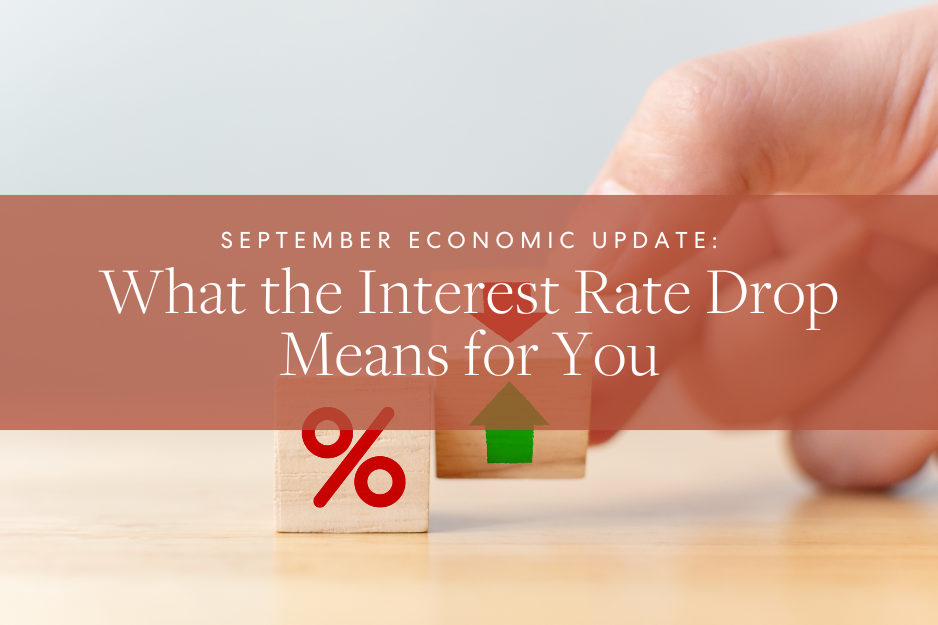How the September Interest Rate Cut Impacts Homeowners, Buyers, and Renewals in 2025
On September 17th, the Bank of Canada reduced its overnight rate by 25 basis points (from 2.75% to 2.5%), marking its latest move to ease financial pressure on Canadians. While a quarter-point drop may sound minor, its timing — and its ripple effects — are significant.
Here’s what it means for homeowners, buyers, and anyone planning their next real estate move.
A Shift in Sentiment
Over the past year, falling interest rates, flattening home prices, and rising household incomes have made housing more affordable — at least temporarily. But as economists point out, most of those gains are now in the rearview mirror.
We’re entering a phase where affordability improvements will depend more on steady incomes and stable prices than on further rate cuts.
Still, even small rate changes can have an outsized impact on buyer psychology. When people hear that rates are coming down, they feel more confident — and confidence drives activity. We’re already seeing that reflected in September’s higher sales numbers across the GTA.
The Renewal Reality
According to the Bank of Canada’s own research, 60% of Canadian mortgages will come up for renewal in 2025–2026. That means many homeowners will soon face decisions about whether to renew early, switch lenders, or change terms.
If you currently hold a variable-rate mortgage, you’ve already felt the direct effects of rate changes — and this latest cut offers immediate relief. But if you’re considering a fixed rate, the good news is that most are now under 4%, providing some breathing room after two years of record highs.
One key takeaway from this moment: don’t wait passively for more cuts.
Lenders typically allow a rate hold for up to 120 days, so locking in now can secure today’s rates even if you close later this year. If another cut does occur, you’ll still benefit — and if rates climb again, you’ll be protected.
Strategic Renewals and Common Pitfalls
Many Canadians renew their mortgage with their existing lender simply for convenience — in fact, about 69% stay with the same lender, according to recent surveys. But this loyalty often comes at a cost.
Ratehub.ca found that homeowners who don’t shop around end up paying about $155 more per month on average, or nearly $9,300 extra over five years.
That’s why we always recommend starting renewal discussions four to six months before your renewal date. It gives you time to compare offers, negotiate, and align your mortgage strategy with your life plans.
If you’re planning to move or refinance within the next few years, a variable rate might give you more flexibility and lower penalties. But if your situation is stable and you value predictability, a fixed rate can provide peace of mind at today’s competitive levels.
The Bigger Picture
The truth is, affordability improvements may slow in the coming months. Wage growth is cooling, employment rates in Ontario have softened, and the “easy wins” from falling rates are behind us. But that doesn’t mean opportunity has disappeared — it’s just shifting.
In today’s environment, strategy matters more than timing. Whether you’re buying your first home, refinancing to improve cash flow, or exploring investment opportunities, your decisions should align with your personal goals and financial comfort — not short-term market noise.
At The Sharda Group, we believe this is one of those rare windows where the market rewards preparedness. With interest rates easing and confidence rebuilding, those who plan ahead and act decisively will be the ones who benefit most when momentum returns.
If you’d like to review your mortgage renewal, explore pre-approval options, or discuss how this rate environment affects your buying or selling plans — we’re here to help.
Let’s make your next move an informed one.
Sources
FICO Survey Finds 90% of Canadians Value Customer Experience Over Products and Services | FICO
A Review of Ontario's Housing Market in 2025 | TeraIntelligence
Renewing your mortgage? What the Bank of Canada’s rate cut means for you - National | Globalnews.ca
How much is bank loyalty really costing you? | Ratehub.ca






